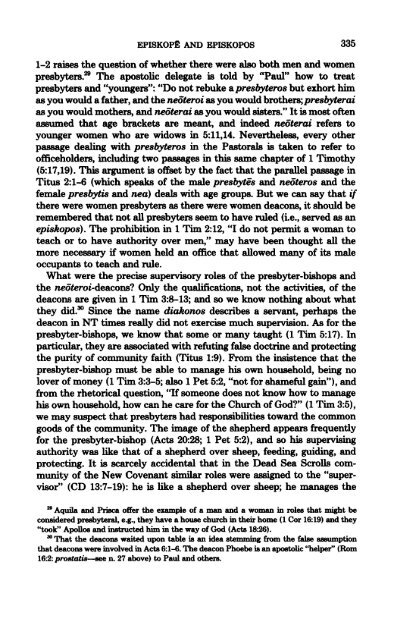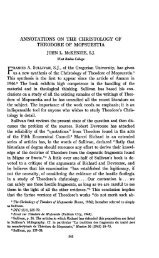episkopë and episkopos: the new testament evidence - Theological ...
episkopë and episkopos: the new testament evidence - Theological ...
episkopë and episkopos: the new testament evidence - Theological ...
Create successful ePaper yourself
Turn your PDF publications into a flip-book with our unique Google optimized e-Paper software.
EPISKOPË AND EPISKOPOS 335<br />
1-2 raises <strong>the</strong> question of whe<strong>the</strong>r <strong>the</strong>re were also both men <strong>and</strong> women<br />
presbyters. 29 The apostolic delegate is told by "Paul" how to treat<br />
presbyters <strong>and</strong> "youngers": "Do not rebuke & presbyteros but exhort him<br />
as you would a fa<strong>the</strong>r, <strong>and</strong> <strong>the</strong> neöteroi as you would bro<strong>the</strong>rs; presbyter ai<br />
as you would mo<strong>the</strong>rs, <strong>and</strong> neöterai as you would sisters." It is most often<br />
assumed that age brackets are meant, <strong>and</strong> indeed neöterai refers to<br />
younger women who are widows in 5:11,14. Never<strong>the</strong>less, every o<strong>the</strong>r<br />
passage dealing with presbyteros in <strong>the</strong> Pastorals is taken to refer to<br />
officeholders, including two passages in this same chapter of 1 Timothy<br />
(5:17,19). This argument is offset by <strong>the</strong> fact that <strong>the</strong> parallel passage in<br />
Titus 2:1-6 (which speaks of <strong>the</strong> male presbytes <strong>and</strong> neöteros <strong>and</strong> <strong>the</strong><br />
female presbytis <strong>and</strong> nea) deals with age groups. But we can say that if<br />
<strong>the</strong>re were women presbyters as <strong>the</strong>re were women deacons, it should be<br />
remembered that not all presbyters seem to have ruled (i.e., served as an<br />
<strong>episkopos</strong>). The prohibition in 1 Tim 2:12, "I do not permit a woman to<br />
teach or to have authority over men," may have been thought all <strong>the</strong><br />
more necessary if women held an office that allowed many of its male<br />
occupants to teach <strong>and</strong> rule.<br />
What were <strong>the</strong> precise supervisory roles of <strong>the</strong> presbyter-bishops <strong>and</strong><br />
<strong>the</strong> neôteroi-deacons? Only <strong>the</strong> qualifications, not <strong>the</strong> activities, of <strong>the</strong><br />
deacons are given in 1 Tim 3:8-13; <strong>and</strong> so we know nothing about what<br />
<strong>the</strong>y did. 90 Since <strong>the</strong> name diakonos describes a servant, perhaps <strong>the</strong><br />
deacon in NT times really did not exercise much supervision. As for <strong>the</strong><br />
presbyter-bishops, we know that some or many taught (1 Tim 5:17). In<br />
particular, <strong>the</strong>y are associated with refuting false doctrine <strong>and</strong> protecting<br />
<strong>the</strong> purity of community faith (Titus 1:9). From <strong>the</strong> insistence that <strong>the</strong><br />
presbyter-bishop must be able to manage his own household, being no<br />
lover of money (1 Tim 3:3-5; also 1 Pet 5:2, "not for shameful gain"), <strong>and</strong><br />
from <strong>the</strong> rhetorical question, "If someone does not know how to manage<br />
his own household, how can he care for <strong>the</strong> Church of God?" (1 Tim 3:5),<br />
we may suspect that presbyters had responsibilities toward <strong>the</strong> common<br />
goods of <strong>the</strong> community. The image of <strong>the</strong> shepherd appears frequently<br />
for <strong>the</strong> presbyter-bishop (Acts 20:28; 1 Pet 5:2), <strong>and</strong> so his supervising<br />
authority was like that of a shepherd over sheep, feeding, guiding, <strong>and</strong><br />
protecting. It is scarcely accidental that in <strong>the</strong> Dead Sea Scrolls community<br />
of <strong>the</strong> New Covenant similar roles were assigned to <strong>the</strong> "supervisor"<br />
(CD 13:7-19): he is like a shepherd over sheep; he manages <strong>the</strong><br />
29 Aquila <strong>and</strong> Prisca offer <strong>the</strong> example of a man <strong>and</strong> a woman in roles that might be<br />
considered presbyteral, e.g., <strong>the</strong>y have a house church in <strong>the</strong>ir home (1 Cor 16:19) <strong>and</strong> <strong>the</strong>y<br />
"took" Apollos <strong>and</strong> instructed him in <strong>the</strong> way of God (Acts 18:26).<br />
30 That <strong>the</strong> deacons waited upon table is an idea stemming from <strong>the</strong> false assumption<br />
that deacons were involved in Acts 6:1-6. The deacon Phoebe is an apostolic "helper" (Rom<br />
16:2: prostatic—see n. 27 above) to Paul <strong>and</strong> o<strong>the</strong>rs.
















